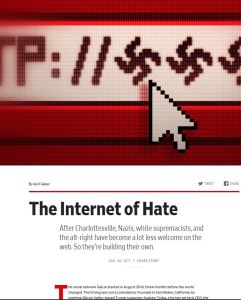Join getAbstract to access the summary!

Join getAbstract to access the summary!
April Glaser
The Internet of Hate
After Charlottesville, Nazis, white supremacists, and the alt-right have become a lot less welcome on the web. So they’re building their own.
Slate, 2017
What's inside?
Will censorship by tech giants lead to the birth of a new alt-right version of the Internet?
auto-generated audio
1×
Log in to listen to the audio summary.
auto-generated audio
Recommendation
After several tech companies, including Google, shut down extremist platforms, several members of alt-right movements are planning to create an alternative Internet ostensibly built around a broader definition and application of free speech. Tech writer April Glaser's article describes the developments before cleverly looping back to the question: No matter where you stand politically, do you want a few powerful tech companies to have the power to decide who gets to be on your Internet? getAbstract recommends this detailed account to anyone interested in the balance among free speech, hate speech, and the disparate political views in current American culture.
Summary
About the Author
April Glaser is a technology writer whose work appears in several online publications, including Slate and Recode.
Learners who read this summary also read
Book
Book
Article
Book
Book



















Comment on this summary